How To Preserve Eggs With Rice and Cooking Oil for 6 Months Without Refrigeration
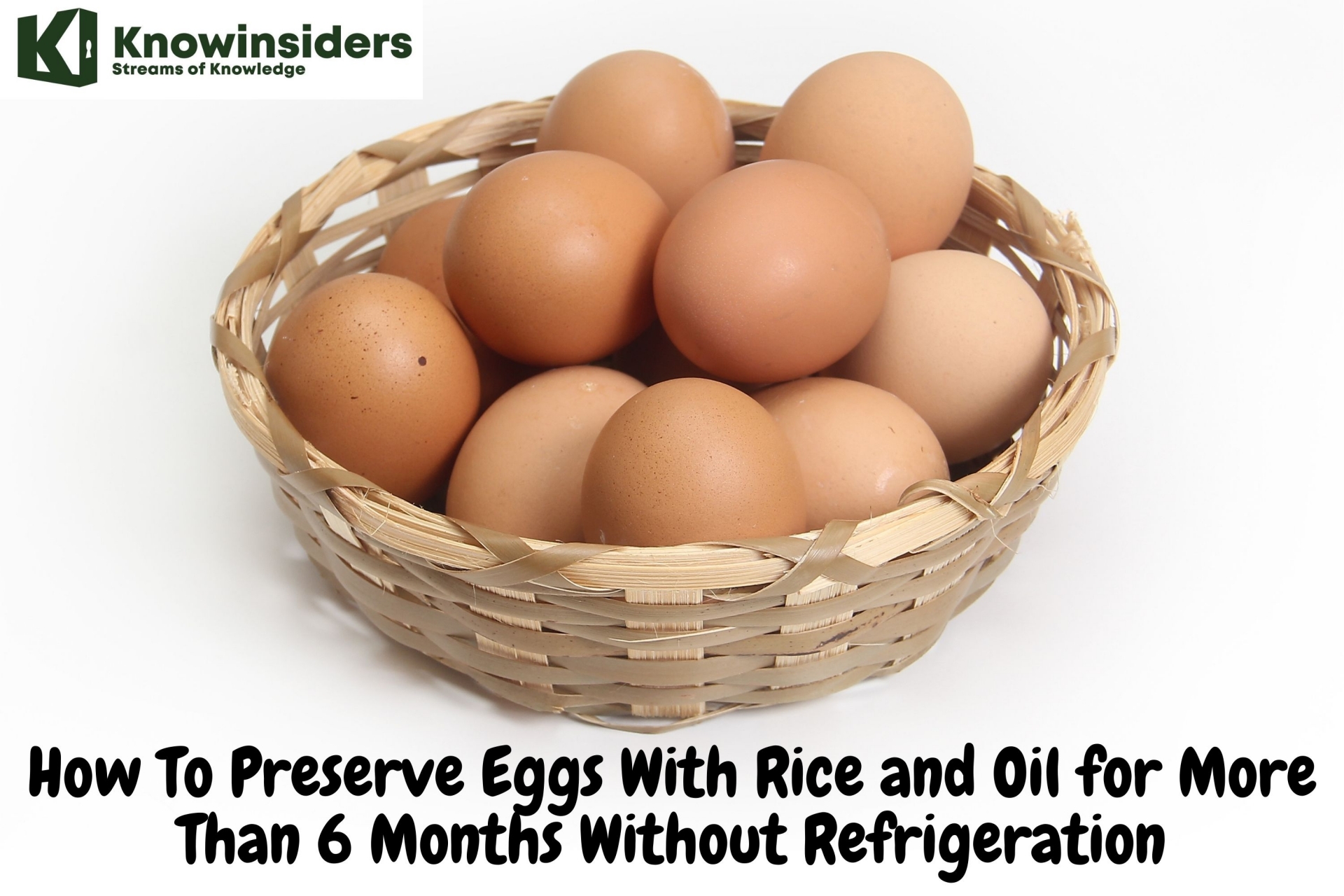 |
| How To Preserve Eggs With Rice and Oil for More Than 6 Months Without Refrigeration |
| Table of Content |
Why Should Eggs be Stored for a Long Time?
Eggs are an indispensable food on the dinner table of many families and are known as "the ideal nutrient reservoir".It has high nutritional value containing a lot of protein, fat, vitellin and many vitamins, Essential minerals for the human body.
Not only that, eggs can also be processed into many different delicious dishes, so many families often have the habit of storing eggs. However, when buying eggs, some people think that the eggshell is covered with a lot of dirt, so wash it with water before putting it in the refrigerator, this is a mistake. Because on the surface of the egg there is a protective film, so although we can't see it, its function is to isolate the air, prevent the penetration of bacteria, if this membrane is destroyed after cleaning. This will greatly reduce the shelf life, so do not wash eggs in water before storing.
Every cruising cookbook will mention some way of preserving eggs on long voyages. How to preserve eggs when looking for long-term storage is easy. In fact, for those who raise poultry, it is a necessity.
The most commonly asked question for those new to poultry keeping, do eggs need to be refrigerated, will also be addressed in this article. The most common practices used to preserve eggs are freezing and dehydrating. However, it is also necessary to discuss the following two techniques, using rice products and using cooking oil.
Never Leave Eggs in the Refrigerator Door
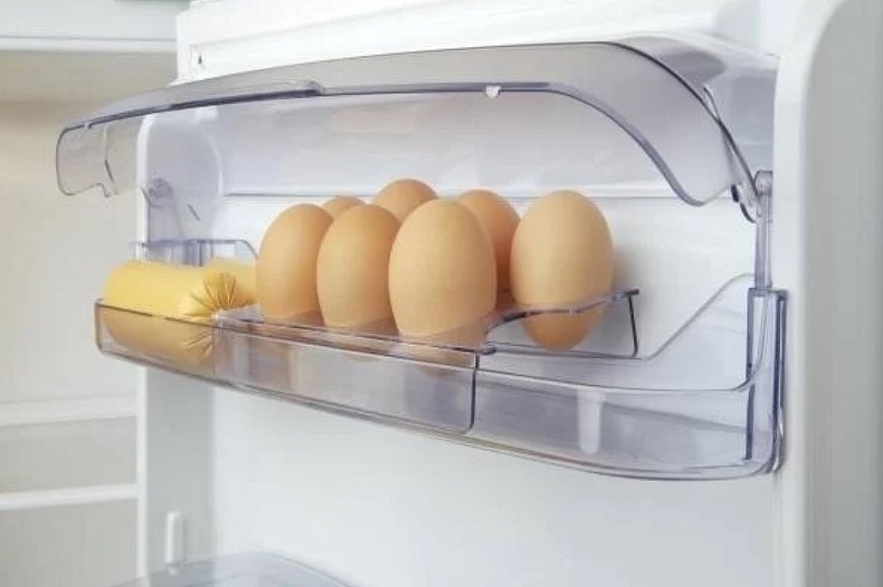 |
| Never Leave Eggs in the Refrigerator Door |
Many women often have the habit of placing eggs in the refrigerator door. However, this is not the right position because the cabinet door is a place that is always opened often, so the temperature in the door is uneven, possibly the hottest part of the cabinet. Therefore, eggs when stored in the door of the cabinet will spoil faster.
The best way to store eggs in the refrigerator is to clean them, then put them in a carton and store them in the refrigerator.
In addition, if eggs have been stored in the refrigerator, you should not take them out and leave them in the open air.
The tiny water droplets on the eggshell will seep in and cause the egg to spoil faster. Even with the most advanced refrigerator, eggs when stored in the refrigerator should only be used for about 3-5 weeks. If you take the eggs out of the refrigerator, use them within 2 hours!
| Most people leave their eggs in the refrigerator door. However, this is not the ideal location to store eggs. The refrigerator door has a much higher temperature than the inside. Therefore, eggs left in the refrigerator door will spoil much faster than in conventional coolers. The refrigerator door is the most unstable place on this appliance. The reason is that when you open and close the refrigerator door often, the food stored here will become warmer than the food stored in other compartments. Therefore, eggs left in the refrigerator door will spoil quickly. In addition, the opening and closing of the cabinet door also exerts a force on the cabinet door. The force from the cabinet door makes the eggs wobble, reducing quality. |
How to Preserve Eggs for Long-term Storage - More Than 6 Months
The primary reason for raising poultry is the ability to consume farm-fresh eggs. Eggs were laid by humanely raised chickens, chickens who are allowed to live their best lives.
It is hard to imagine that during the peak egg-laying season, March through early September, we take for granted having fresh eggs on hand. It is the arrival of molting season and the decline of daylight hours that quickly reminds us that fresh eggs need to be preserved, and quickly.
The easiest way to squirrel away eggs is to reserve 1/4 of the weekly egg production. This amount may shock many, but in truth it really is not that much to set aside, considering your flock can very well go 7 months without laying an egg. Because of this, it is best to preserve eggs for baking, cooking, or directly from the shell to make homemade egg noodles or eggs for breakfast.
Learn about freezing fresh eggs, dehydrating, freeze-drying, and water glassing eggs, and more then choose the best method for you and your property.
So how to preserve eggs when many families often send up a lot of "clean eggs"? Big head down or small end down? If the refrigerator does not have enough space, how can I store it?
Try the methods below!
What Are The Best Way To Store Eggs?
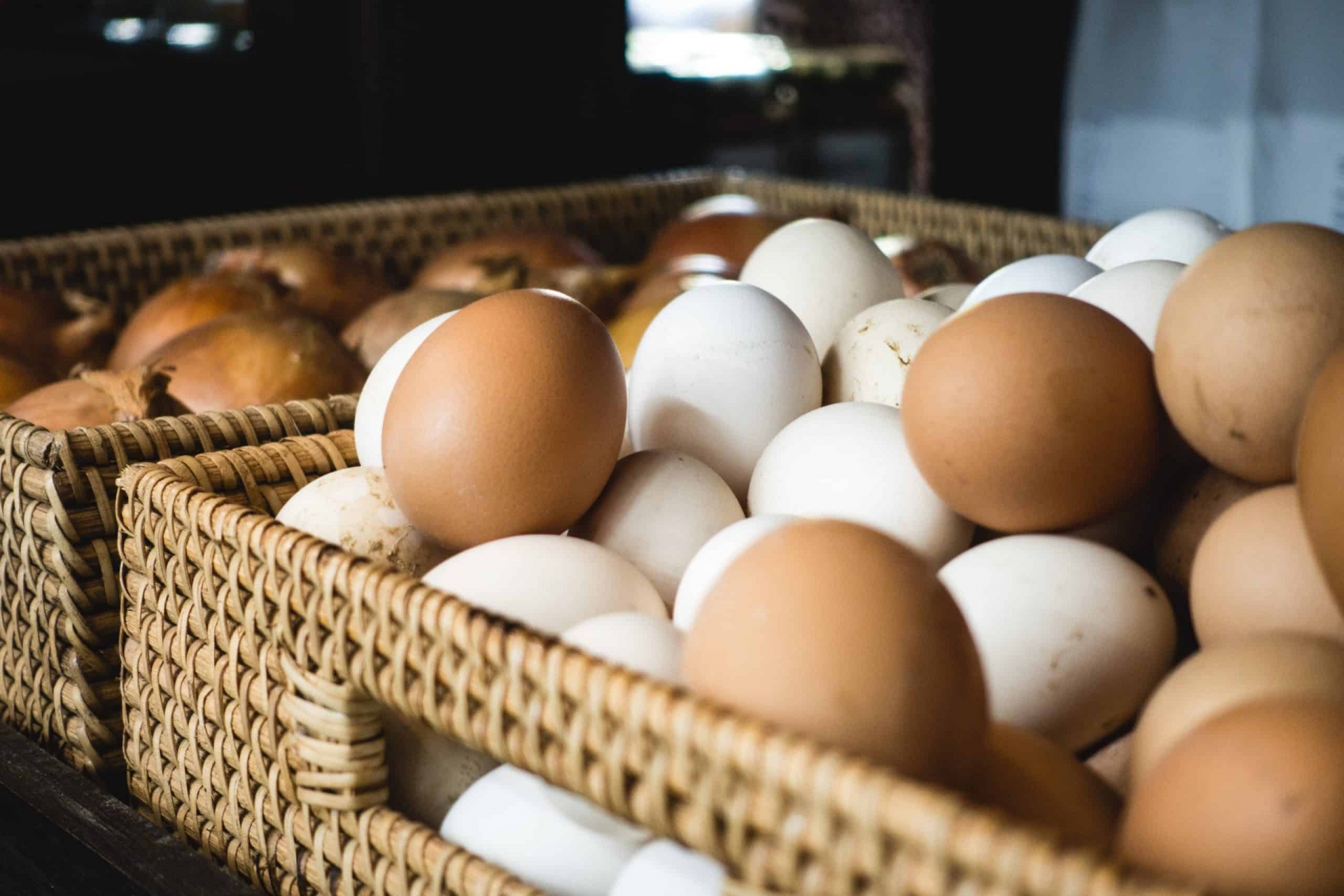 |
| Photo: homesteadingfamily |
The best way to keep eggs is to store them in their original carton in the refrigerator as soon as possible after purchase. Cartons reduce water loss and protect flavors from other foods being absorbed into the eggs. Storing eggs lose, or in specially designed sections of the refrigerator is not recommended as this also exposes eggs to greater risk of damage.
How To Preserve Eggs With Rice
Preparing the most common rice at home, burying each egg in the rice, will reduce the temperature and prevent the air, thus slowing down the process inside the egg, more efficient and ensuring the freshness of the egg.
Or prepare a clean and dry carton, then spread some dry bran on the bottom of the barrel, this bran is not common in cities, we can also use soybeans, green beans, rice and other types of rice. other cereals instead. Put the bran on the bottom of the barrel and then put one layer of eggs, one layer of bran and then another layer of eggs, and so on.
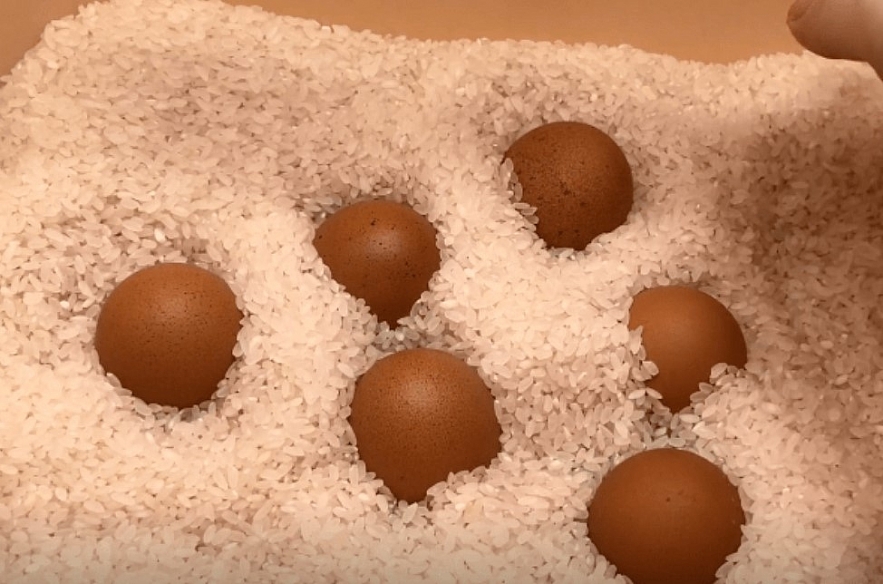 |
| Preserve Eggs With Rice |
After arranging, put in a cool corner, eggs can be preserved for several months, even six months. If you store them with nuts, don't throw them away, wash them twice with clean water and you can use them as usual.
Using rice husks is one of the most effective ways to preserve eggs without refrigeration. You spread the dry rice husks (or sawdust) into clean cardboard, lay an egg layer on top and continue to sprinkle another layer of rice husks, and so on until the eggs are used up. Place the egg carton in a cool, dry place. This can help you preserve the eggs for several months. Eggs should be checked every 20 days.
How To Preserve Eggs With Cooking Oil
First, we use a dry towel to wipe the entire egg, this operation is to clean the dust on the surface of the egg.
Expose all the tiny holes in the eggshell. Prepare the most common cooking oil at home and spread the oil evenly over the eggshell.
This can block the small openings in the eggshell, preventing the moisture in the eggshell from evaporating and outside bacteria from entering the egg, so the egg won't spoil naturally. However, this method preserves eggs for less time than the first method.
You only need to apply a thin layer of vegetable oil to the eggshell and then put it on a tray, store it in a cool and dry place, the temperature is between 25-32 degrees Celsius. You keep the eggs fresh for approximately 1 month. by this.
How To Preserve Eggs With Mineral Oil
Real eggs are one of the few foods that can fill your belly, refuel your body, and replenish your nutrient stores without taking up a lot of room in your shelter or stash. The biggest issue with eggs, assuming you don’t have your own flock of healthy laying birds, is that they don’t last long without refrigeration. The last thing you need is to forget about an egg tucked in the back of your cache and have it explode in a foul-smelling bacteria bomb. Kiss your food stores goodbye.
Enter mineral oil preservation. Egg preservation with mineral oil is relatively simple, it has been used for ages, and the method in which this works has a solid basis in cold, hard science. Mineral oil is cheap, easy to find, simple to store, and a little goes a long way! A nice bonus is that it has other uses in survival situations, so it’s not a one-trick pony.
Related: How to Boil Eggs in Different Styles?
Easy Ways To Preserve Eggs At Home
Preserved in rice bran
Take a wooden crate or jar, its utensils, spread a thick layer of bran under it. Then arrange the eggs on top, 1 layer of bran into 1 layer of egg.
In the top layer, you spread a thick layer of bran and cover with a lid. Turn every 10 days to see if the eggs may be deformed. This method can keep eggs fresh for 4-6 months.
Use newspaper
Use a soft paper towel to wipe the stains on the outside of the eggs, then soften the newspaper, covering each egg individually. Put the eggs in a thin basket, store in a dry and ventilated place. Here are tips for storing eggs without a refrigerator to keep them fresh for 1-2 months.
Use dry tea dregs
How to preserve eggs with dry tea dregs is very good. After drinking the tea, you save the residue and dry it to preserve the eggs. The preservation method is similar to using rice husk or sawdust. Spread the tea powder layers, alternating egg layers and leave in a cool, dry place. This preservation method can keep eggs fresh for 2-3 months.
Other Ways To Preserve Eggs With Instructions
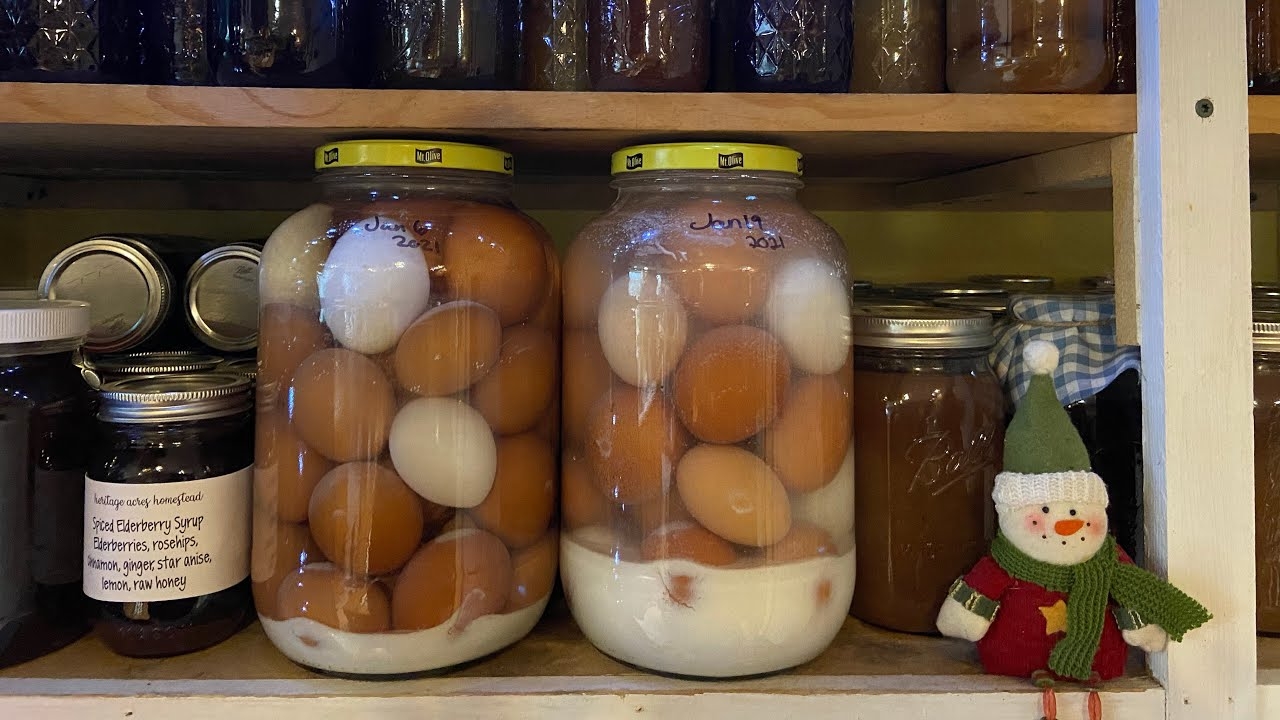 |
| Photo: Youtube |
1. Preserving Eggs in Lime Solution
This one is an all-time favorite method of preserving eggs but it has steadily fallen out of style as most people no longer have lime lying around their homes. However, it is one of the safest methods (lime is a natural antimicrobial used to keep disease away from fruit trees and homes for ages) and 100% failproof ( it works every time with 100% success rate – no eggs are lost in the process if done right).
Plus fresh eggs will stay safe to eat up to 2 years (no refrigeration needed). There will be some losses in the texture and flavor departments, though, but nothing biggie.
Equipment and Ingredients
1-ounce hydrated lime
1 quart distilled or filtered water
clean, fresh farm eggs (not washed)
jar/another container with largemouth
Instructions
First make the lime solution in which the eggs will be preserved. Mix 1 ounce hydrated lime (use an digital scale to get the quantity right, not a measuring cup) with 1 quart of water. You can scale down or up, depending on the size of the container. Mix everything well.
Place the eggs in the solution in the container. Put a lid on the container to prevent evaporation (some people use a thick film of olive oil). You can add more eggs to the lime solution over time but make sure that you consume the oldest eggs first.
The best consumed by date for eggs preserved in lime is usually 9 months. But there are numerous reports about eggs being perfectly edible after a couple of years, too. It is my favorite method of preserving eggs in case SHTF. It is both cost effective and ultra effective. Plus, fresh eggs have the longest expiration date this way (without refrigeration).
2. Freezing Eggs
Freezing fresh eggs is the easiest method for preserving them. What is needed is a large silicone ice-cube tray and a freezer-safe container for storing the frozen eggs. Freezer-safe Ziploc bags are often used, however, I prefer vacuum-sealing them in small bags. This prevents any issue of freezer burn from occurring.
Equipment
♦ Large silicone ice-cube trays
♦ Hand whisk or immersion stick blender
Instructions
Because most recipes call for the use of two eggs I place two eggs into each section of the silicon tray.
♦ Using a hand whisk, scramble two eggs at a time. Add the lightly scrambled eggs to the tray. Continue this pattern until the tray is full.
♦ Cover the tray with plastic wrap, aluminum foil, or parchment paper, allowing the eggs to completely freeze.
♦ Remove eggs from the silicon tray and package for storing.
Freezing fresh eggs does not require the eggs to be reconstituted. Simply place the frozen eggs into a ziploc bag and place them into the refrigerator or bowl of room temperature water to thaw.
3. Dehydrating Eggs
Dehydrating eggs to create a powder is quite easy to achieve, however, you will need a dehydrator for this method. Egg powder is used for making scrambled eggs, omelets, and baked goods.
Equipment
Dehydrator (a rear mounting fan is the most efficient dehydrator available)
Instructions
→ Using a hand whisk, whisk eggs well until the yolk and whites are thoroughly blended.
→ Line the dehydrator trays with parchment paper or fruit leather sheets (order from the company which the dehydrator was purchased).
→ Slowly add scrambled eggs to the drying trays, set the temperature to the appropriate drying time mentioned in the dehydrator’s manual. Based on the placement of the fan, eggs will take between 12 to 18 hours to dry.
→ Once completely dried, place the eggs into a blender, food processor, or NutriBullet and grind to a powder. Store powder eggs in a glass mason jar with an oxygen absorber. Vacuum seal the jars to preserve the freshness.
→ To reconstitute the powder eggs add 2 tablespoons of powdered eggs to 6 tablespoons of water. The powder eggs do not need to be reconstituted, simply add the dried eggs and water directly to the mixing bowl along with the other ingredients.
4. Water Glassing Eggs
Water glassing eggs is the most traditional means for preserving eggs. Documentation of water glassing dates back to the 1800’s with a recipe found in Fannie Farmer’s cookbook titled, Fannie Farmer Boston Cookbook School. It has been reported that eggs which are preserved using the water glassing technique will keep for up to 18 months without rotting. However, the longer the eggs sit the runnier the whites and yolk becomes.
Equipment and Ingredients
→ 3-gallon food-grade bucket
→ 5-ounce hydrated lime, pickling lime
→ 5-quarts distilled water, natural spring water
→ fresh eggs, clean and unwashed (must not have waste or excessive amounts of mud or dirt)
Instructions
→ In a 3-gallon bucket add an equal ratio of water to lime. 5-quarts water to 5-ounces of lime provides enough room for the eggs to be submerged. The 1-quart of water to 1-ounce of lime is the ratio which is to be used regardless of the container size.
→ Mix the pickling lime and water until completely dissolved.
→ Next, gently add unwashed fresh eggs to the liquid. When able add the eggs pointy side down allowing the air sack to remain at the top of the eggs.
→ Securely add the lid to the bucket to prevent the liquid from evaporating and the eggs from becoming exposed to air. Store the water glass eggs in a cool dark location, withdrawing eggs as needed and wash well prior to using.
→ Pulling eggs from the bottom of the bucket first allows you to use the oldest eggs first. However, pulling a small amount which will be used within a few days saves from having to withdraw an egg each time one is needed. Make sure to store these eggs in the refrigerator until ready to use.
How to Choose Good Eggs
♦ Check the egg shell: If you pay close attention, you will see that new, good eggs usually have a thin white chalk layer. If the shell is too smooth, bright, or there is a feeling of cracks, the eggs are left in the nest for a long time and are of poor quality. When touching the eggshell, fresh eggs often feel a bit rough and heavy in the hand. The opposite is poor eggs.
♦ Examine the eggs: Hold an egg through a light bulb, or use a rolled up notebook or newspaper, look at the egg under sunlight, if you see that the egg's air chamber is small, the yolk is not mobile, the white is clear. transparent orange-red and light pink, the yolk is round and in the middle is a complete, fresh egg. And old eggs left for a long time when examined, are often seen as red with many ridges, mobile surrounds and large air chamber voids.
♦ Shake gently: Hold the egg to your ear and gently shake it, if there is a noise, the egg is bad, for a long time. If you don't need to listen and shake the eggs to see the strong movement, the eggs are broken, the eggs are incubating...
When choosing eggs, if possible, use a 10% salt solution to drop the eggs, if the eggs sink to the bottom of the water bottle, it is a new egg laid during the day. If the egg floats on the water, the egg has been laid for more than 5 days. Or you can hold the egg between the index and female fingers, shake it lightly if the egg is newly laid, it will not sound, and if it is laid for a long time, there will be a cry.
How to Store Eggs in the Fridge
Clean eggs before storing
If you find the egg has stains, use a soft cloth/paper to wipe it off and then put it in the refrigerator. Absolutely do not wash eggs with water before putting them in the refrigerator as this will make the eggs spoil faster.
Place eggs in the right direction
To keep eggs fresh longer, you should not leave the eggs horizontal because the yolk will float to the top and stick to the shell. Eggs should be arranged vertically, with the big end facing up, the small end facing down. Thus, the floating yolk will meet the air bubble inside the egg and not be close to the shell.
Keep the eggs in the refrigerator. With fried and fried foods, you can take eggs from the refrigerator and process them right away. With cakes, you should leave the eggs outside for them to return to room temperature before processing.
The ideal time to store eggs in the refrigerator is 3-5 weeks. If eggs have been taken out of the refrigerator, they should be used within 2 hours.
Should use egg stand
If the eggs come in a box, just put the box in the fridge. When processing, just take the right amount of eggs to use.
If eggs are purchased from the market and do not have a container, you can prepare your own egg carton. This box will have a recessed egg compartment so you can place the eggs in the right direction and prevent the eggs from rolling out and falling. At the same time, some types of boxes have lids that will help prevent eggs from colliding or contacting other foods in the cabinet. This will prevent bacteria from entering the egg.
Conclusion
When storing eggs, do not put them together with foods with strong odors such as onions, ginger, garlic, chili, etc. These odors will penetrate the eggs through the pores on the shell, which will make the eggs spoil faster and shorten shelf life.
Eggs stored in the refrigerator should be eaten as soon as possible after taking them out, as some water droplets will form on the surface of the eggs when they are removed from a relatively cold environment, bacteria will stick to the surface. eggshell. Accelerates the spoilage of eggs.
Above are 2 simple methods to preserve eggs that you can completely apply right away. If the family is often sent "clean eggs" in the countryside in large quantities, the two methods above are really necessary for your family. Let's apply!
How do I know if the eggs go BAD?Use your nose! You will pass out! Play the Sink or Float game! Sink = GOOD Float = BAD When a chicken lays an egg it has a protective layer on it called the bloom that helps keep the oxygen from penetrating the shell. If you have backyard chickens that lay eggs you can skip putting mineral oil on since they already have the protective layer they need. Because of regulations and making sure no one gets sue-happy, companies wash the protective layering off since it has some germs, and they mark eggs with a shelf-life that is MUCH shorter than necessary. |
 How to Make Fried Eggs in American, French, Mexican Styles? How to Make Fried Eggs in American, French, Mexican Styles? Just about every culture has their own unique way of cooking eggs. We rounded up most popular global egg recipes you can make at home ... |
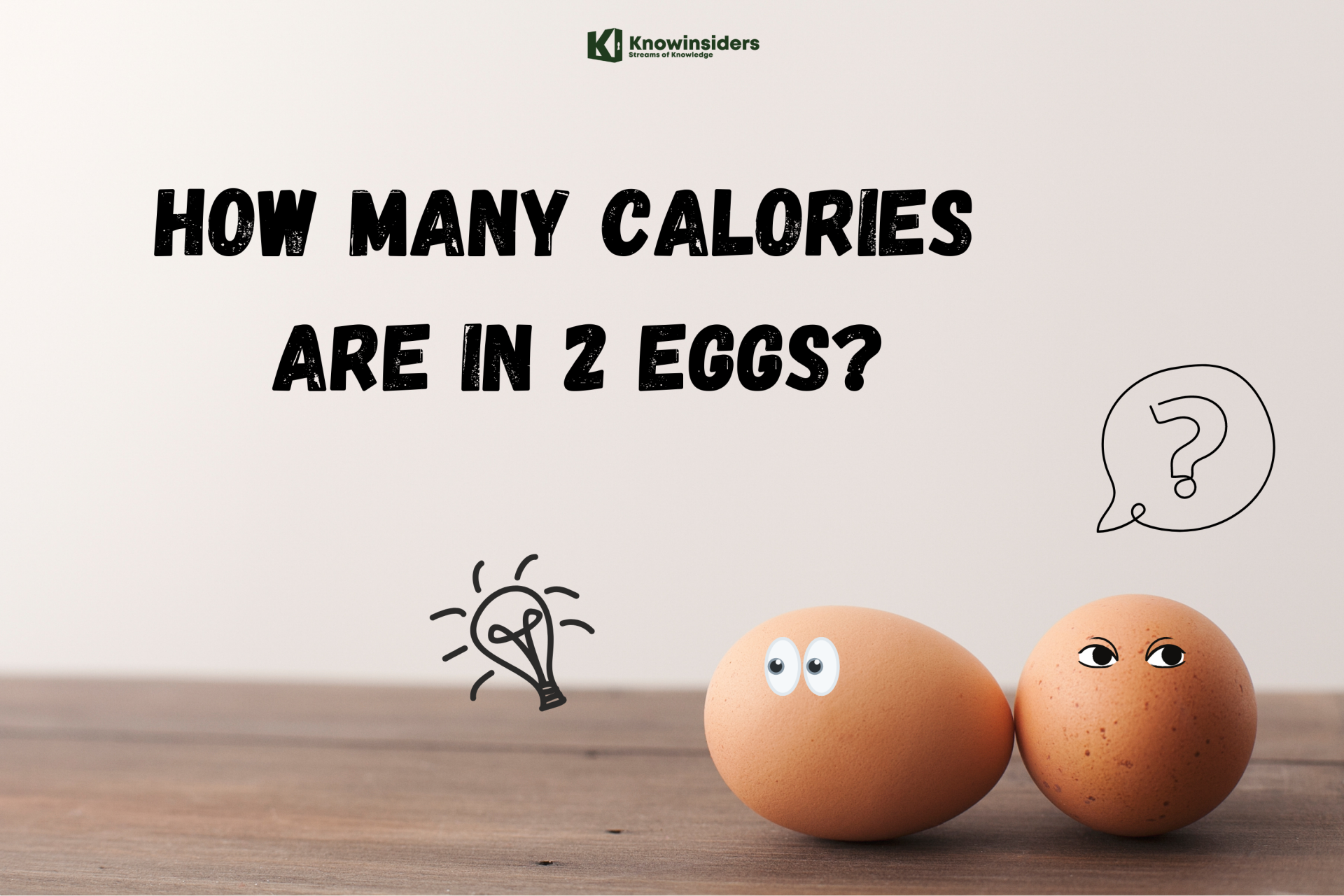 How Many Calories Are In 2 Eggs? How Many Calories Are In 2 Eggs? Eggs are a protein and nutrient powerhouse. They can be added to many dishes and prepared in numerous ways. How many calories are in 2 ... |
 How to Make Tomato and Egg Drop Noodle Soup with Easy Steps How to Make Tomato and Egg Drop Noodle Soup with Easy Steps Scroll down to know how to make Tomato and Egg Drop Noodle Soup - a beloved Hong Kong dish with approximately one billion variations! |























